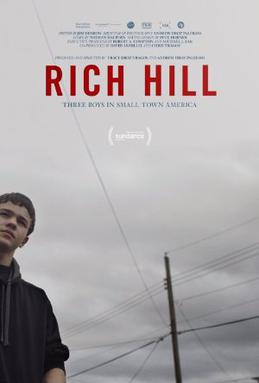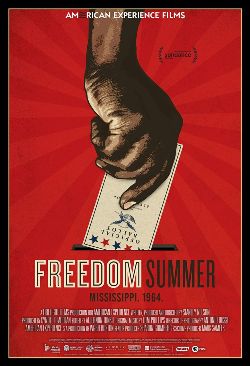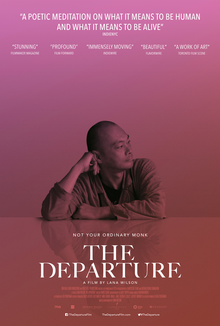
The Sundance Film Festival is an annual film festival organized by the Sundance Institute. It is the largest independent film festival in the United States, with 423,234 combined in-person and online viewership in 2023. The festival takes place every January in Park City, Utah; Salt Lake City, Utah; and at Sundance Resort, and acts as a showcase for new work from American and international independent filmmakers. The festival consists of competitive sections for American and international dramatic and documentary films, both feature films and short films, and a group of out-of-competition sections, including NEXT, New Frontier, Spotlight, Midnight, Sundance Kids, From the Collection, Premieres, and Documentary Premieres. Many films premiering at Sundance have gone on to be nominated and win Oscars such as Best Picture, Best Director and Best Actor in a Leading Role.

Life According to Sam is an HBO original documentary film directed by Sean Fine and Andrea Nix Fine. Premiering in January 2013 at the Sundance Film Festival, the documentary discloses the impact that progeria had on the lives of Sam Berns and his parents, Dr. Leslie Gordon and Dr. Scott Berns. It was broadcast on HBO in October 2013, and since then it has won a 2013 Peabody Award and an Emmy Award for Exceptional Merit in Documentary Filmmaking. It was also one of the 15 titles considered for nomination in the Documentary Feature category for the 86th Oscars.

Alive Inside: A Story of Music and Memory is a 2014 American documentary film directed and produced by Michael Rossato-Bennett. The film premiered in the competition category of U.S. Documentary Competition program at the 2014 Sundance Film Festival on January 18, 2014. It won the Audience Award: U.S. Documentary at the festival. The documentary explores diseases that impair neurological function, such as Alzheimer's disease and dementia, and proposes a treatment option that is claimed to improve a patient's quality of life. It discusses that the elderly community are on the decline in social status and that western society neglects old age to idealize youth. It includes a series of interviews with individuals of neurology, geriatrics, and music. The documentary tells the story of patients and their experience with music therapy and creating personalized playlists for elderly patients with dementia and Alzheimer's disease based on their music preferences.

E-Team is a 2014 American documentary film co-directed and produced by Katy Chevigny and Ross Kauffman. The film premiered in the competition category of U.S. Documentary Competition program at the 2014 Sundance Film Festival on January 18, 2014. Rachel Beth Anderson and Ross Kauffman won the Cinematography Award: U.S. Documentary at the festival, as well as the Candescent Award.

Dawn Porter is an American documentary filmmaker and founder of production company Trilogy Films. Her documentaries have screened at The Sundance Film Festival and other festivals as well as on HBO, CNN, Netflix, Hulu, PBS and elsewhere. She has made biographical documentaries about a number of historical figures including Bobby Kennedy, Vernon Jordan, and John Lewis and has collaborated with Oprah and Prince Harry.

Marmato is a 2014 American documentary film written, directed and produced by Mark Grieco. It is the debut feature film of Grieco. The film premiered in competition category of U.S. Documentary Competition program at the 2014 Sundance Film Festival on January 17, 2014, where it won the Candescent Award.

Rich Hill is a 2014 American documentary film co-produced and directed by Andrew Droz Palermo and Tracy Droz Tragos about Rich Hill, Missouri. The film premiered at the 2014 Sundance Film Festival, where it won the U.S. Grand Jury Prize for a documentary.

Freedom Summer is a 2014 American documentary film, written, produced and directed by Stanley Nelson Jr. The film had its world premiere at 2014 Sundance Film Festival on January 17, 2014.

Candescent Films is an American film production company that produces and finances documentary and narrative films that explore social issues.
Lilly Hartley is an American documentary film producer and actress, and the founder of Candescent Films.

Eliza Hittman is an American screenwriter, film director, and producer from New York City. She has won multiple awards for her film Never Rarely Sometimes Always, which include the New York Film Critics Circle Award and the National Society of Film Critics Award—both for best screenplay.

Dreamcatcher is a 2015 British-American documentary film directed by Kim Longinotto focusing on Brenda Myers-Powell, a former professional who runs The Dreamcatcher Foundation, a charity which helps women in Chicago leave the sex industry. The film won the World Cinema Directing Award in the documentary category at the 2015 Sundance Film Festival. Showtime Networks acquired the rights to the film on 23 January 2015.
Jerry Rothwell is a British documentary filmmaker best known for the award-winning feature docs How to Change the World (2015), Town of Runners (2012), Donor Unknown (2010), Heavy Load (2008) and Deep Water (2006). All of his films have been produced by Al Morrow of Met Film.

Penny Lane is an American independent filmmaker, known for her documentary films. Her humor and unconventional approach to the documentary form, including the use of archival Super 8 footage and YouTube videos, have earned her critical acclaim.

Unrest is a 2017 documentary film produced and directed by Jennifer Brea. The film tells the story of how Jennifer and her new husband faced an illness that struck Jennifer just before they married. Initially dismissed by doctors, she starts filming herself to document her illness and connects with others who are home- or bedbound with myalgic encephalomyelitis/chronic fatigue syndrome (ME).
Jennifer Brea is an American documentary filmmaker and activist. Her debut feature, Unrest, premiered at the 2017 Sundance Film Festival and received the US Documentary Special Jury Award For Editing. Brea also co-created a virtual reality film which premiered at the Tribeca Film Festival.

City of Ghosts is a 2017 Arabic-language American documentary film about the Syrian media activist group Raqqa Is Being Slaughtered Silently as they face the realities of life undercover, on the run, and in exile after their homeland is taken over by ISIS in 2014. The film was directed by Oscar-nominated and Emmy Award-winning filmmaker Matthew Heineman.
Lana Wilson is an American filmmaker. She directed the feature documentaries After Tiller, The Departure,Miss Americana, and Look Into My Eyes, as well as the two-part documentary Pretty Baby: Brooke Shields. The first two films were nominated for the Independent Spirit Award for Best Documentary.

The Departure is a 2017 American documentary by Lana Wilson. It concerns suicide in Japan. The film premiered at the 2017 Tribeca Film Festival in New York. It was nominated for a 2018 Independent Spirit Award for Best Documentary.

Hale County This Morning, This Evening is a 2018 American documentary film about the lives of black people in Hale County, Alabama. It is directed by RaMell Ross and produced by RaMell Ross, Joslyn Barnes, Su Kim, and is Ross's first nonfiction feature. The documentary is the winner of 2018 Sundance Film Festival award for U.S. Documentary Special Jury Award for Creative Vision, 2018 Gotham Independent Film Award for Best Documentary Feature and the Cinema Eye Honors Outstanding Achievement in Nonfiction Feature Filmmaking. It was nominated for the Academy Award for Best Documentary Feature. After its theatrical run, it aired on the PBS series Independent Lens and eventually won a 2020 Peabody Award.















